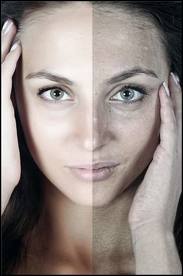While sun damage doesn’t happen overnight, it can seem like it visibly affects the skin in a rather short period of time. The more the skin is exposed to the sun, the more the collagen and elastin in the deeper layers is broken down, giving less support to the underlying muscles and the skin’s surface. As a response mechanism, the skin tries to protect itself from the damage, in turn thickening as a means of regeneration.

Treat sun-damaged skin at home:
Peptides and vitamin A need to be used consistently to help strengthen the skin and improve its texture. Retinol is key since it sheds the top layer of skin and strengthens it from inside out. Use a Retinol regularly, because it keeps the skin in repair mode, creating new collagen and exfoliating the surface.
Free radical-fighting ingredients like green tea and vitamins C and E will help safeguard the skin from future damage.
Protection and maintenance are vital-once sun-damaged skin has been transformed, you don’t want it to regress. It is recommended to wear a sunscreen with ingredients that contain either physical or chemical blockers and broad-spectrum products, which provide protection from all UV rays. Also use antioxidants and a moisturizer.

Treat sun-damaged skin professionally:
Laser and light-based treatments, like Intense Pulsed Light (IPL) and both ablative and nonablative resurfacing procedures, work to reinstate the skin. IPL can help eliminate brown and red spots on the face and body. A downtime-free treatment, although several sessions are required, IPL helps to rejuvenate the skin so that it looks younger and fresher.
Treatments that tackle sun-damaged skin, including chemical peels, can improve the skin, too. But, if not done properly, they can cause more harm than good. Acid-based peels buffer the skin, making it more sensitive to the sun.
Fractional lasers, like Fraxel, get rid of discoloration while improving the skin’s texture. Instead of employing light, fractional resurfacing lasers create microscopic wounds in the skin-as the skin heals, the sun-damaged areas scab and flake off, and collagen is purportedly increased.
Interval treatments will be needed over time, because nothing lasts forever- not even the results of lasers. Re-treatments every now and then will help maintain the longevity of your results for healthier skin. Please call our office at (817) 473-2120 for more information and questions on laser treatments and skin care. You can also visit our website at www.MarkBisharaMD.com. Dr. Bishara and The Paragon Med Spa provide a wide range of cosmetic procedures to help patients look and feel their best.



